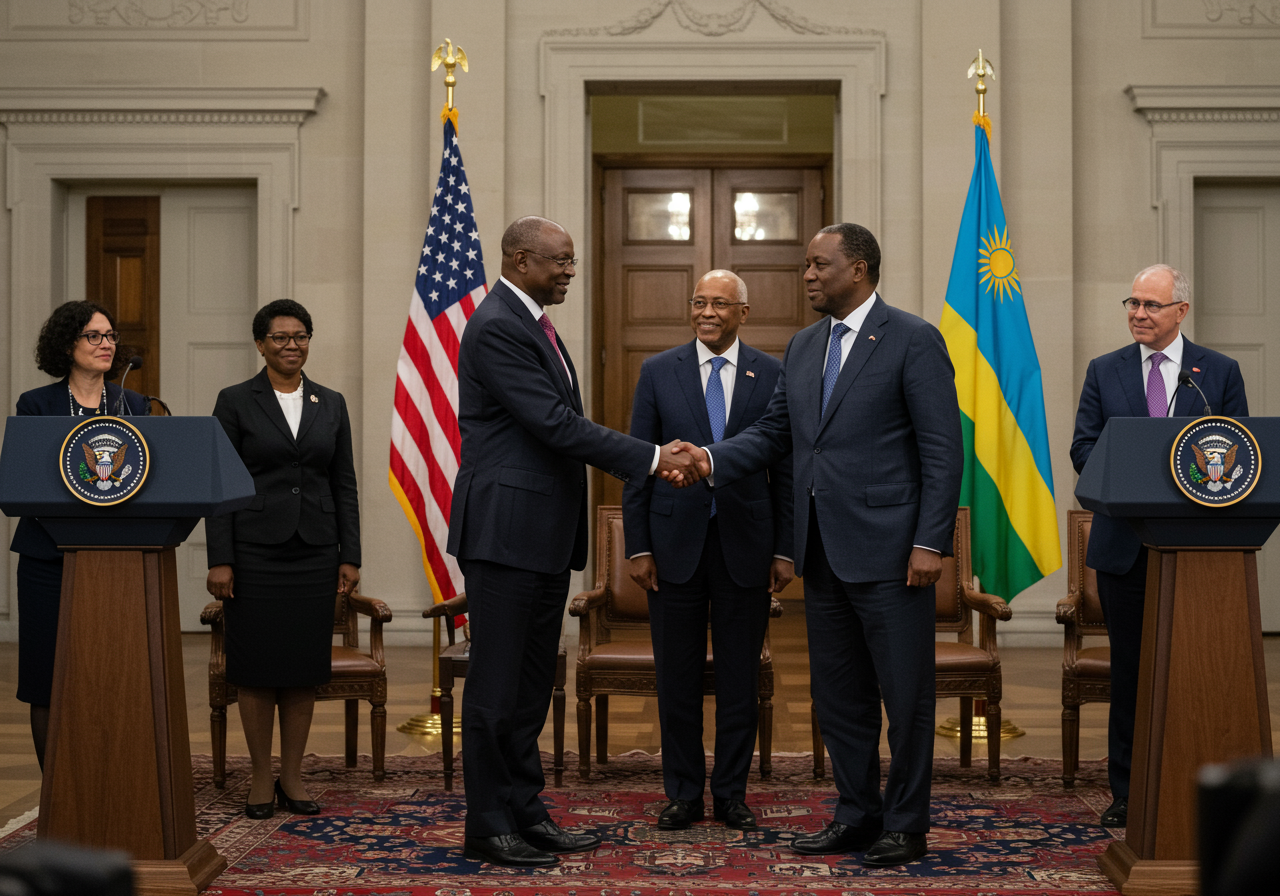In a landmark development, the Democratic Republic of Congo (DRC) and Rwanda have reached a peace agreement in Washington, marking a significant step towards regional stability. This accord was facilitated by the United States, highlighting its role as a pivotal mediator in African geopolitics. The breakthrough aims to halt ongoing tensions that have plagued both nations, contributing to instability and humanitarian challenges.
The Washington Agreement: A New Chapter
The pact, formalized in Washington D.C., comes after several months of diplomatic discussions characterized by complex negotiations. Both Congo and Rwanda have long been engulfed in disputes, primarily centered around border conflicts and allegations of proxy warfare. This agreement signifies a mutual intention to foster peace and cooperation, setting a foundation for long-term reconciliation.
The United States played a critical intermediary role, leveraging its diplomatic influence to guide talks and ensure both parties reached a consensus. The American delegation emphasized the importance of this agreement, highlighting it as a vital step towards achieving enduring stability in the Great Lakes region of Africa.
Background: A History of Tensions
Rwanda and Congo have a tumultuous history characterized by mutual distrust and periodic conflict. The root of tensions can be traced back to the aftermath of the Rwandan Genocide in 1994, which resulted in a mass exodus of people, some of whom crossed into neighboring Congo. This influx intensified ethnic tensions and led to the emergence of various rebel groups, exacerbating instability in the region.
Over the years, intermittent skirmishes and incursions have strained bilateral relations, with both countries accusing each other of supporting rebel factions. Such conflicts have had dire humanitarian repercussions, displacing thousands and stoking regional instability.
The Role of the United States
The U.S. involvement in mediating the peace talks underscores its vested interest in promoting stability in Africa. Washington has historically maintained strategic partnerships with both Kigali and Kinshasa, focusing on security cooperation and economic development. By serving as an impartial facilitator, the U.S. sought to create a conducive environment for dialogue and resolution.
This agreement is seen as a testament to the power of diplomacy, demonstrating how proactive engagement can yield positive outcomes in even the most protracted conflicts. The U.S. initiative included providing platforms for dialogue, offering expert negotiation assistance, and fostering an atmosphere of trust between the parties involved.
Key Provisions of the Peace Agreement
The peace accord outlines several pivotal elements designed to address the root causes of discord and establish a framework for future cooperation:
Border Security: Both nations have agreed to enhance border security measures to prevent unauthorized crossings and combat the proliferation of armed groups.
Reconciliation Efforts: Initiatives to promote ethnic reconciliation and social cohesion have been prioritized, with a focus on community engagement and inclusive dialogue.
Economic Collaboration: The agreement emphasizes economic partnerships, encouraging cross-border trade and development projects to stimulate growth and prosperity.
Security Guarantee: Measures to ensure the safety and security of civilians in conflict-prone areas are integral components of the accord.
These provisions reflect a concerted effort to not only address immediate concerns but also lay the groundwork for sustainable peace and cooperation.
Domestic and International Reactions
The announcement of the peace agreement has been met with cautious optimism both domestically and internationally. In the DRC and Rwanda, leaders and citizens alike have expressed hope that this accord will usher in a new era of peace and development. However, skeptics warn that the success of the agreement hinges on consistent implementation and genuine commitment from both sides.
Internationally, the accord has been lauded as a significant diplomatic achievement. The African Union and various global leaders have welcomed the agreement, emphasizing the importance of African-led solutions to African problems, buoyed by international support.
The Road Ahead: Challenges and Opportunities
While the agreement marks a positive step forward, numerous challenges remain. Ensuring the effective implementation of the accord鈥檚 provisions requires sustained political will and resources. Both nations must overcome historical grievances and build mutual trust, a process that necessitates patience and perseverance.
Opportunities abound for both countries to seize this moment to revamp their bilateral relations. By prioritizing economic cooperation and infrastructure projects, they could set a precedent for regional integration and development. Additionally, collaborative efforts to dismantle rebel groups and address security concerns could pave the way for a secure and prosperous region.
The international community, particularly the United States, has a role to play in supporting these efforts by providing technical assistance, funding, and political backing. Continued engagement from international stakeholders will be vital to ensuring that progress is not only initiated but sustained in the long term.
Ultimately, the peace agreement between Congo and Rwanda represents a crucial opportunity to break free from a cycle of conflict and chart a path toward harmonious coexistence. Success will depend on the continued commitment of both parties to the principles of peace and cooperation, buoyed by unwavering support from the international community.
The significance of this accord cannot be overstated. It embodies a hopeful narrative of potential transformation, serving as a beacon of possibility for other regions embroiled in longstanding disputes. It is a reminder that peace, while challenging, is achievable through dialogue, understanding, and compromise.
